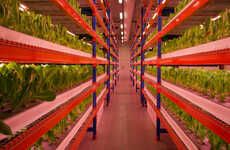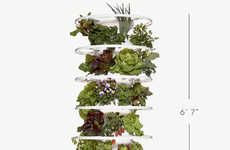Residents of Chicago may one day get to enjoy farm quality food from within their city, thanks to 'Feeder' from Studio Gang. 'Feeder' gets its name from the Ohio highway feeder ramp in Chicago that Studio Gang hopes to turn into a greenhouse someday.
The idea is a genius one -- take a rarely used, flat stretch of infrastructure and turn it into an urban farm. A project like 'Feeder' from Studio Gang would cut down on the costs and CO2 produced by having to haul food in from the country, and it would be a model for other cities to follow.
Freeway Farms
'Feeder' from Studio Gang Turns an Overpass into a Greenhouse Garden
Trend Themes
1. Urban Agriculture - The trend of transforming unused urban spaces into agricultural farms presents an opportunity for sustainable and localized food production.
2. Vertical Farming - The trend of growing crops in vertically stacked layers offers the potential to maximize land use and increase food production in urban environments.
3. Sustainable Food Systems - The trend of creating efficient, self-contained food systems within cities promotes environmental stewardship and reduces dependency on external food sources.
Industry Implications
1. Urban Planning - Urban planning professionals can explore how to integrate urban agriculture projects like 'Feeder' into their designs, fostering sustainable and resilient cities.
2. Agriculture Technology - The agriculture technology industry can develop innovative systems and technologies to support urban farming initiatives, such as vertical farming and hydroponics.
3. Sustainable Food Production - Companies in the sustainable food production industry can explore partnerships and investments in urban agriculture projects to expand their operations and promote local food sustainability.






